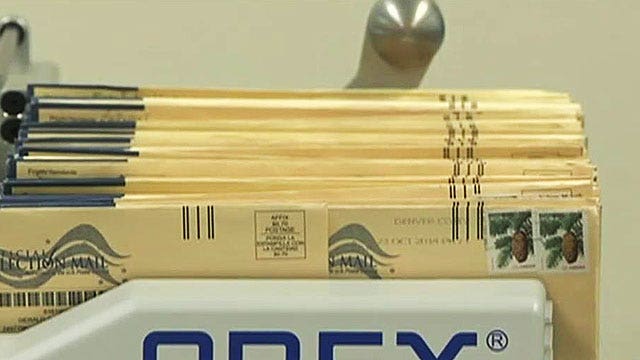Colorado's new election system is being panned by critics as a "ridiculous experiment" that could lead to more voter fraud -- in a year of very tight races with nothing less than control of the Senate on the line.
This election year, every eligible Colorado voter is getting their ballot in the mail. It's a system used by only two other states -- Oregon and Washington.
"We are only the third state in the United States trying this ridiculous experiment," said Marilyn Marks, an anti-voter fraud advocate with the Rocky Mountain Foundation. What's more, she warns, "We have added to it a toxic mix by adding same-day registration."
One of the most worrisome aspects of the new system, for some, is that once ballots are filled in, they are not required to be mailed back. The ballots can be taken to drop-off locations to avoid paying postage. And the law allows for what is known as "ballot harvesting." One individual can collect the ballots of up to 10 people to drop off.
"I'm as worried about undo influence as I am about straight up fraud," Marks said. "There are ballot harvesting groups going door-to-door, asking people to hand over their ballots. You can imagine some more vulnerable members of the community, particularly the elderly, who may feel under pressure."
"Colorado has no effective way of determining whether an individual has collected more than 10 ballots," cautioned El Paso County Clerk Wayne Williams, who also is a candidate for secretary of state. Williams complained that the state has no requirement that "your vote will count if you give it to a ballot harvester who then never turns that ballot in."
Adding to the potential confusion, every registered voter will get a ballot. "The new law requires ballots to be sent to people who may not have voted in decades," Williams said. "In El Paso County, we've had voters report to us that they've received ballots from a voter registration drive for a person who has never lived at that address."
Election officials offer reassurances that all ballot signatures will be verified against voter registration records. Yet Colorado's new same-day voter registration law does not require a photo ID.
"You have to provide a driver's license number, specific to Colorado, a state ID number or your last four of your social," Denver Elections Director Amber McReynolds said.
"If the signature that was provided [for registration] was not accurate to begin with," Williams points out, "there is still a very real possibility of a fake registration resulting in a vote that counts and negates the vote of someone who was legitimately entitled to vote."
Those who still want to vote the old-fashioned way can do so, by bringing their unused mail-in ballots to a polling place and handing them in before voting.
While a small amount of voter fraud might not make a difference in the outcome of most races, the Real Clear Politics polling average has the governors' race in Colorado, between incumbent Democrat John Hickenlooper and GOP challenger Bob Beauprez, tied at 45 percent each.
In the U.S. Senate race, the RCP average has GOP challenger Cory Gardner up by only 3.6 percentage points over Democratic Sen. Mark Udall, who is fighting to win a second term.
The new election laws were passed by a Democratically controlled state legislature. So far, though, voter turnout numbers provided by the Colorado secretary of state's office show that Republicans are turning in ballots in much larger numbers than either Democrats or those registered as unaffiliated.












































